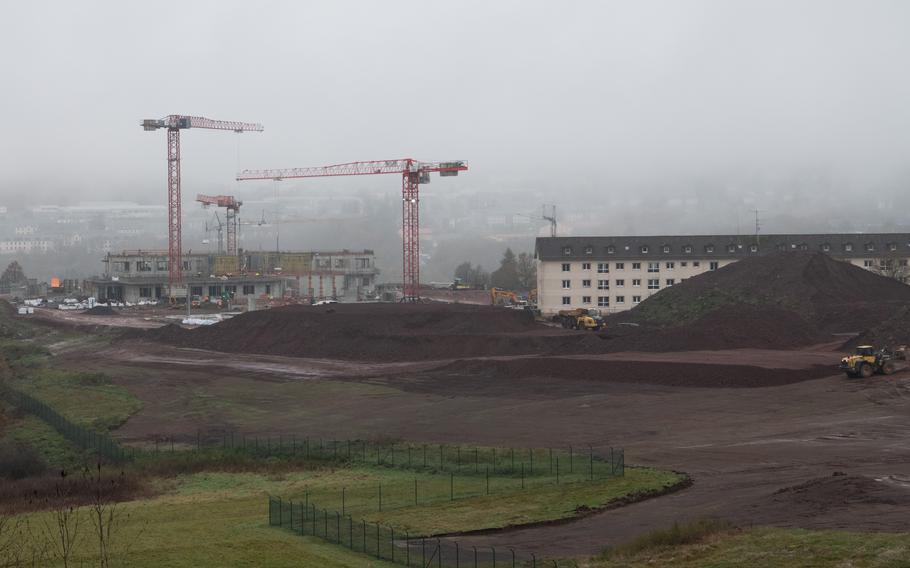
A new elementary school, left, being built on Wetzel Kaserne in Baumholder, Germany, Nov. 14, 2024. The dirt in the foreground is where dozens of townhouses are to be built to accommodate troops moving to Baumholder. (Phillip Walter Wellman/Stars and Stripes)
BAUMHOLDER, Germany — The Army is appealing to potential landlords here in southwestern Germany to rent out their homes to soldiers, saying they’ll need hundreds of additional properties to house troops in the coming years to meet expected growth.
The number of Americans living in and around Baumholder is set to increase from roughly 8,000 to about 10,000 between 2026 and 2029, as U.S. special operations troops shift to the area from Stuttgart and support staff arrive.
The Army is spending $1 billion on improvements, including new housing, ahead of the move.
“Even with all the housing construction ongoing on Baumholder, we know that we will face a shortage of housing units for families and single soldiers,” Col. Jeff Higgins, commander of U.S. Army Garrison Rheinland-Pfalz, said during a meeting at Smith Barracks on Thursday attended by regional mayors.
More than 500 families currently reside in rental housing units in Baumholder and surrounding areas, according to Army figures.
By 2029, when the arrival of special operations troops is expected to be complete, up to 300 additional off-post rentals will be needed to house soldiers and their families, according to garrison officials.
The population figure of 10,000 includes soldiers, civilians and other members of their household.
The garrison, which has described the growth as an investment opportunity for homeowners, has agreed to work with property owners to make sure their homes are aligned with Army Family Housing standards before the influx of troops.
They say they will send experts to inspect potential properties and detail any changes or improvements that are needed.
The Army will not pay for the modifications. But homes in base towns typically earn higher rents than those in similarly sized areas elsewhere.
Higgins attempted to reassure property owners that their investments would pay off, despite renewed concerns that the number of U.S. troops in Germany could drop during Donald Trump’s second term as president.
Toward the end of Trump’s first term, a plan was devised to remove some 12,000 troops from Germany and reposition them in the U.S. and other European countries. The plan never got far and was shelved soon after President Joe Biden’s inauguration.
“I won’t address politics, but the movement of those (special operations) soldiers will occur,” Higgins said, referring to their arrival in Baumholder. He added that much of the $1 billion of development was already underway.
Baumholder District Mayor Berd Alsfasser also attempted to calm concerns at Thursday’s meeting, pointing out that it was already known that the special operations troops would move to Baumholder during Trump’s first term.
Some of the development work underway in Baumholder includes remodeling apartments on Smith Barracks that were built in the 1950s and new townhouses on nearby Wetzel Kaserne.
An elementary school is also under construction on Wetzel, and a high school is scheduled to be built in the coming years.
New playgrounds, roads and water lines are among projects scheduled to be rolled out through 2031.
The U.S. Army has operated out of Baumholder since 1951, with troop numbers ebbing and flowing over the decades.
Higgins, whose garrison is made up of installations over a vast area, said the importance of the work being done can’t be overstated.
“My number one priority across the entire garrison is Baumholder investment and setting the conditions for that move to occur, to receive those soldiers and their family members and integrate them properly into our military community and into the host nation community,” Higgins said.